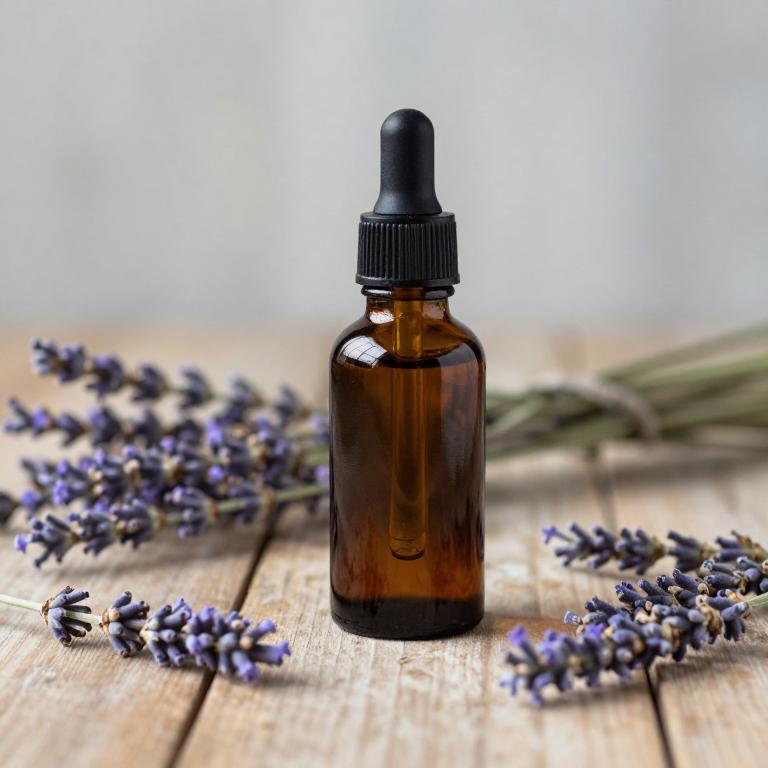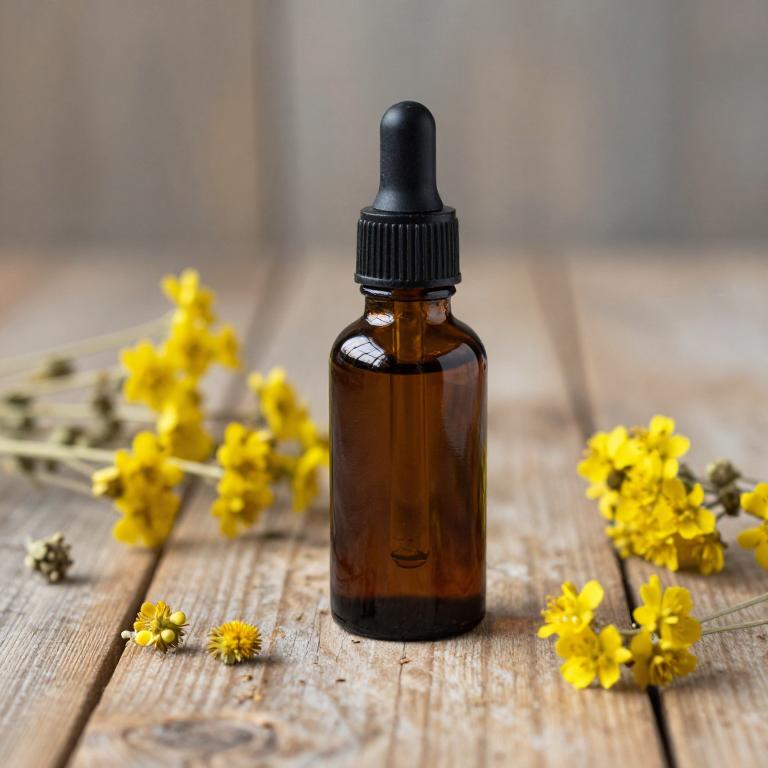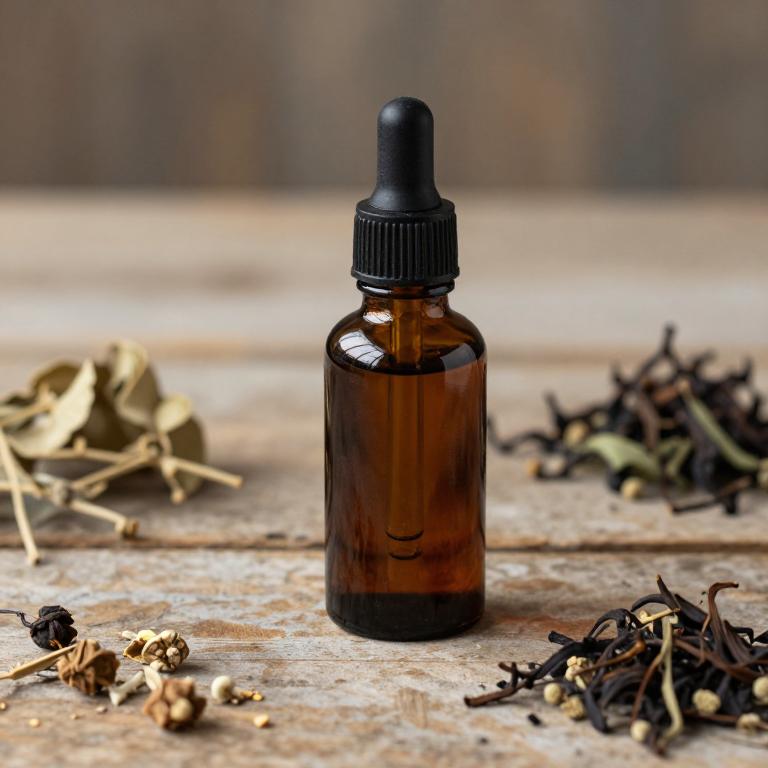10 Best Herbal Tinctures For Fever Blister On Lip

Herbal tinctures can be a natural and effective remedy for treating fever blisters on the lips, often containing antiviral and anti-inflammatory properties.
Commonly used herbs such as echinacea, goldenseal, and calendula are known for their ability to reduce the duration and severity of cold sores caused by the herpes simplex virus. These tinctures are typically prepared by soaking dried herbs in alcohol, allowing the active compounds to be extracted for topical application. Applying a few drops of the tincture directly to the affected area several times a day may help soothe the blister and promote healing.
However, it is important to consult a healthcare professional before using herbal tinctures, especially if you have allergies or are taking other medications.
Table of Contents
- 1. St. john's wort (Hypericum perforatum)
- 2. English lavender (Lavandula angustifolia)
- 3. Echinacea (Echinacea purpurea)
- 4. Yarrow (Achillea millefolium)
- 5. Dog rose (Rosa canina)
- 6. Lemon balm (Melissa officinalis)
- 7. Ginger (Zingiber officinale)
- 8. Camellia (Camellia sinensis)
- 9. Stinging nettle (Urtica dioica)
- 10. Marigold (Calendula officinalis)
1. St. john's wort (Hypericum perforatum)

Hypericum perforatum, commonly known as St. John's wort, is a traditional herbal remedy that has been used for centuries to treat various ailments, including skin conditions.
When prepared as a tincture, it can be applied topically to fever blisters on the lips, which are often caused by the herpes simplex virus. The tincture contains compounds such as hypericin and hyperforin, which have antiviral and anti-inflammatory properties that may help reduce the symptoms of cold sores. While some studies suggest it may aid in the healing process, it is important to consult a healthcare professional before use, as it can interact with certain medications.
Overall, hypericum perforatum tinctures offer a natural alternative for managing fever blisters, though their efficacy can vary among individuals.
2. English lavender (Lavandula angustifolia)

Lavandula angustifolia, commonly known as English lavender, is often used in herbal tinctures for its soothing and antiviral properties.
These tinctures are traditionally applied topically to fever blisters on the lips to help reduce inflammation and discomfort. The essential oils in lavender, such as linalool and lavandicine, have antimicrobial effects that may help prevent the spread of the herpes simplex virus. When diluted properly, lavender tinctures can be safely applied to the affected area several times a day.
However, it is advisable to consult a healthcare professional before using herbal remedies, especially if symptoms persist or worsen.
3. Echinacea (Echinacea purpurea)

Echinacea purpurea herbal tinctures are commonly used for their potential antiviral and immune-boosting properties, which may help in managing fever blisters on the lips.
These tinctures are typically made by steeping the dried leaves and flowers of the echinacea plant in alcohol, creating a concentrated herbal solution. While some studies suggest that echinacea may reduce the duration and severity of cold sores caused by the herpes simplex virus, more research is needed to confirm its effectiveness specifically for fever blisters. When applying echinacea tincture to a fever blister, it is important to dilute it with a carrier oil or water to avoid irritation.
As with any herbal remedy, it is advisable to consult a healthcare professional before use, especially for individuals with sensitive skin or existing health conditions.
4. Yarrow (Achillea millefolium)

Achillea millefolium, commonly known as yarrow, has been traditionally used in herbal medicine for its anti-inflammatory and antiseptic properties.
When prepared as a tincture, it may offer potential benefits for treating fever blisters on the lips due to its ability to reduce inflammation and promote healing. To use yarrow tincture for this purpose, it should be diluted with water or a carrier oil to avoid skin irritation. Applying a small amount of the diluted tincture to the affected area several times a day may help soothe the blister and prevent secondary infections.
However, it is important to consult with a healthcare provider before using any herbal remedy, especially if there are underlying health conditions or if the blister shows signs of worsening.
5. Dog rose (Rosa canina)

Rosa canina, also known as rosehip, is a traditional herbal remedy that has been used for centuries to support immune function and promote skin health.
Rosa canina herbal tinctures are often used to address fever blisters on the lips, which are caused by the herpes simplex virus. The tincture contains high levels of vitamin C and antioxidants, which may help reduce inflammation and support the body's natural healing processes. These tinctures are typically taken internally in small doses to boost the immune system and may also be applied topically to the affected area for additional relief.
While not a cure for cold sores, rosa canina tinctures can be a natural and supportive option when used as part of a holistic approach to managing fever blisters.
6. Lemon balm (Melissa officinalis)

Melissa officinalis, commonly known as lemon balm, is a versatile herb often used in the form of tinctures to address various health concerns, including fever blisters on the lips.
The tincture is typically prepared by extracting the fresh or dried leaves of the plant with alcohol, preserving its active compounds such as rosmarinic acid and flavonoids. These compounds are believed to have antiviral, anti-inflammatory, and calming properties that can help reduce the symptoms of cold sores. When applied topically, the tincture may help soothe the affected area, decrease the duration of the outbreak, and promote healing.
However, it is important to consult with a healthcare professional before using lemon balm tinctures, especially if you have allergies or are taking other medications.
7. Ginger (Zingiber officinale)

Zingiber officinale, commonly known as ginger, has been traditionally used for its anti-inflammatory and antiviral properties, making it a potential natural remedy for fever blisters on the lips.
Herbal tinctures made from fresh or dried ginger root can be applied topically to reduce the swelling, pain, and duration of cold sores caused by the herpes simplex virus. These tinctures work by stimulating circulation and promoting the body's natural healing processes. However, it is important to dilute the tincture with a carrier oil or water to avoid irritation, as undiluted ginger can be too strong for sensitive skin.
While ginger tinctures may offer relief, they should not replace medical treatment, especially for severe or recurrent outbreaks.
8. Camellia (Camellia sinensis)

Camellia sinensis, commonly known as the plant source of green and black tea, is sometimes used in herbal tinctures for its potential anti-inflammatory and antiviral properties.
While there is limited scientific evidence supporting its use for fever blisters on the lips, some traditional remedies suggest that camellia sinensis tinctures may help reduce symptoms due to their high concentration of polyphenols. These tinctures are typically prepared by steeping dried leaves in alcohol, creating a concentrated extract that may have soothing effects on the affected area. However, it is important to consult with a healthcare professional before using any herbal tinctures, as they may interact with other medications or cause allergic reactions.
Overall, while camellia sinensis tinctures may offer some comfort, they should not replace conventional treatments for fever blisters.
9. Stinging nettle (Urtica dioica)

Urtica dioica, commonly known as stinging nettle, is a plant that has been traditionally used in herbal medicine for its anti-inflammatory and antiviral properties.
Herbal tinctures made from Urtica dioica may be used topically to help alleviate symptoms of fever blisters on the lips, which are often caused by the herpes simplex virus. The tincture is typically applied directly to the affected area using a clean swab, and it is believed to help reduce swelling, redness, and the duration of the outbreak. However, it is important to note that while some individuals may find relief from using nettle tinctures, they should not replace conventional medical treatments for herpes.
Always consult with a healthcare professional before using any herbal remedy, especially if you have a known allergy to plants in the Urtica family.
10. Marigold (Calendula officinalis)

Calendula officinalis herbal tinctures are traditionally used to support the healing of fever blisters on the lips due to their anti-inflammatory and antiseptic properties.
The tincture, typically made by soaking dried calendula flowers in alcohol, can be applied topically to the affected area to reduce redness, swelling, and discomfort. Its soothing effects may help promote faster healing and prevent secondary infections. While calendula is generally considered safe for topical use, it is advisable to perform a patch test before applying it to a fever blister.
As a complementary therapy, calendula tinctures may be used alongside other treatments recommended by a healthcare provider for optimal results.